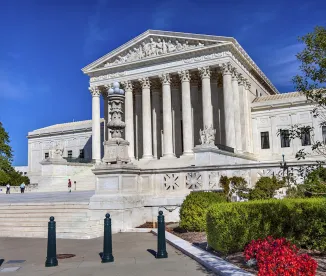The legal landscape around abortion rights has changed greatly following the U.S. Supreme Court’s decision in Dobbs v. Jackson Women’s Health Organization, No. 19-1392 (June 24, 2022), which ended a nearly 50-year precedent protecting the right to abortion and opened the door for states to implement and enforce new laws on access to abortion. As a result, many employers have been considering new policies and benefit offerings based on these changes.
Employers must carefully monitor state and federal laws to evaluate the risks associated with any such offerings to employees. Policies that provide time off or reimbursement for travel when going to another jurisdiction for an abortion have been the focus of much attention since Dobbs due to claims that they violate certain state laws. However, there is little guidance from the courts and regulators on the extent to which these state laws apply to employers. Moreover, employees who are not covered by employer policies and benefits that facilitate access to abortion may look to the Americans with Disabilities Act (ADA) and Title VII of the Civil Rights Act for protection from discrimination.
States expanding restrictions on abortion are generally doing so through: (1) “trigger laws” designed to take effect immediately after the Supreme Court overturned Roe v. Wade; (2) enforcement of laws previously enjoined by the courts; and (3) new legislation or ballot initiatives.
Trigger Laws
A trigger law is legislation that was enacted by a state knowing it could not be enforced until a triggering event would put it into effect at a later time. Some states drafted their trigger laws to go into effect immediately after the Supreme Court overturned Roe, while others required actions by attorneys general or governors once they determined that developments in the law (such as the Supreme Court’s decision in Dobbs) lifted federal restrictions over state abortion laws.
Thirteen states had abortion laws triggered by Dobbs. However, the trigger laws in North Dakota, Utah, and Wyoming are temporarily enjoined from taking effect, subject to a final decision from the courts that issued those orders (a ruling on the North Dakota law is expected soon). The remaining trigger laws (Arkansas, Idaho, Kentucky, Louisiana, Mississippi, Missouri, Oklahoma, South Dakota, Tennessee, and Texas) are in effect and have either not been challenged or survived attempts at a preliminary injunction. (In Idaho, a temporary injunction was granted on August 24, 2022, for the limited exception of medical providers who provide abortion care to pregnant people in emergency situations. Litigation continues.)
Previously Enjoined Legislation Now in Effect
Some states had legislation that was enacted before the Supreme Court’s 1973 decision in Roe, but the laws were unenforceable due to the Court’s ruling that individuals had certain federal constitutional rights to abortion. Over the nearly 50 years that Roe was the law of the land, many states repealed their pre-Roe bans and, therefore, they would need to pass a new law to further regulate abortion rights. Some states that did not repeal their pre-Roe legislation began enforcing their laws as soon as the Court issued Dobbs. Other states appear not to be moving forward with enforcement of pre-Roe laws (although they probably could) and at least one state (Wisconsin) has asked a court to affirmatively rule that its pre-Roe law is invalid. The states with pre-Roe abortion bans in place are: Alabama, Arizona, Arkansas, Michigan, Mississippi, North Carolina, Oklahoma, Texas, West Virginia, and Wisconsin.
There are pending court challenges to the pre-Roe bans in Arizona, Michigan, West Virginia, and Wisconsin. Michigan is the first to have a pre-Roe ban permanently enjoined by the court. Additionally, the pre-Roe bans in Arizona and West Virginia are preliminarily enjoined. At the time of this writing, there has not yet been a decision for Wisconsin’s law.
Many states also passed legislation regulating abortion after the Roe decision. It is estimated that more than 1,200 laws have been enacted restricting access to abortion since Roe. These range from total abortion bans, such as the one passed in Alabama in 2019 (currently in effect), to the 15-week ban passed in Florida earlier this year (currently in effect, but subject to litigation). Many of these laws were enjoined by courts because they restricted abortions in a way that interfered with rights established by Roe. In many instances, state attorneys general or governors reopened old cases or brought new ones to have these injunctions lifted immediately after the Dobbs decision.
New Legislation
Indiana and West Virginia are the first two states to pass legislation after the Dobbs decision, and both enacted near-total abortion bans with minimal exceptions. Indiana’s ban is enjoined and West Virginia’s is in effect. South Carolina appears to be on the cusp of passing legislation. Many states are likely waiting for their next legislative session before tackling the issue. Newly passed bills are expected to be subject to immediate court challenges.
Ballot Initiatives
States are using ballot initiatives to solidify or remove rights to abortion. In August, Kansas voted down a ballot initiative that would have removed constitutional protection for abortion. In November, Kentucky will vote on whether its constituents agree that nothing in their state constitution protects the right to abortion. On the other hand, California, Michigan, and Vermont will vote to amend their state constitutions to include explicit protections to abortion.
What Should Employers Do Now
Laws regulating abortion can potentially impact the employment relationship in many ways and employers must proceed with careful consideration of the existing legal landscape while tracking the rapidly evolving changes under state laws. For example, after Dobbs, some employers began taking action to expand paid time off policies or add employee benefits that provide reimbursement for travel when employees do not have access to certain healthcare in their local area. Employers must ensure these actions do not conflict with restrictions under state law, such as those that make it a civil or criminal violation to “aid and abet” someone accessing an abortion.
In some situations, the federal ERISA law preempts state laws relating to employee benefit plans, but there is uncertainty in how the preemption doctrine will apply to these situations.
Employers also must consider whether policy changes raise issues under rules requiring parity for different health conditions, as well as potential discrimination claims based on gender, pregnancy or disability where a medical procedure or gender is given enhanced benefits not accessible to others.
Even in the absence of policy changes, employers must be sure to consider potential coverage under the ADA, Family and Medical Leave Act, and existing leave policies when an employee needs additional time off for travel because a medical procedure is not available locally.
The road ahead will undoubtedly involve more legislation, followed by court challenges that will take time to wind their way through the judicial system. It could be years before many of these issues are settled. In the meantime, employers should look out for the many different legal implications that may be triggered by their actions — employee benefits, disability and medical leave, discrimination issues, employee privacy, and even criminal laws.







 />i
/>i
